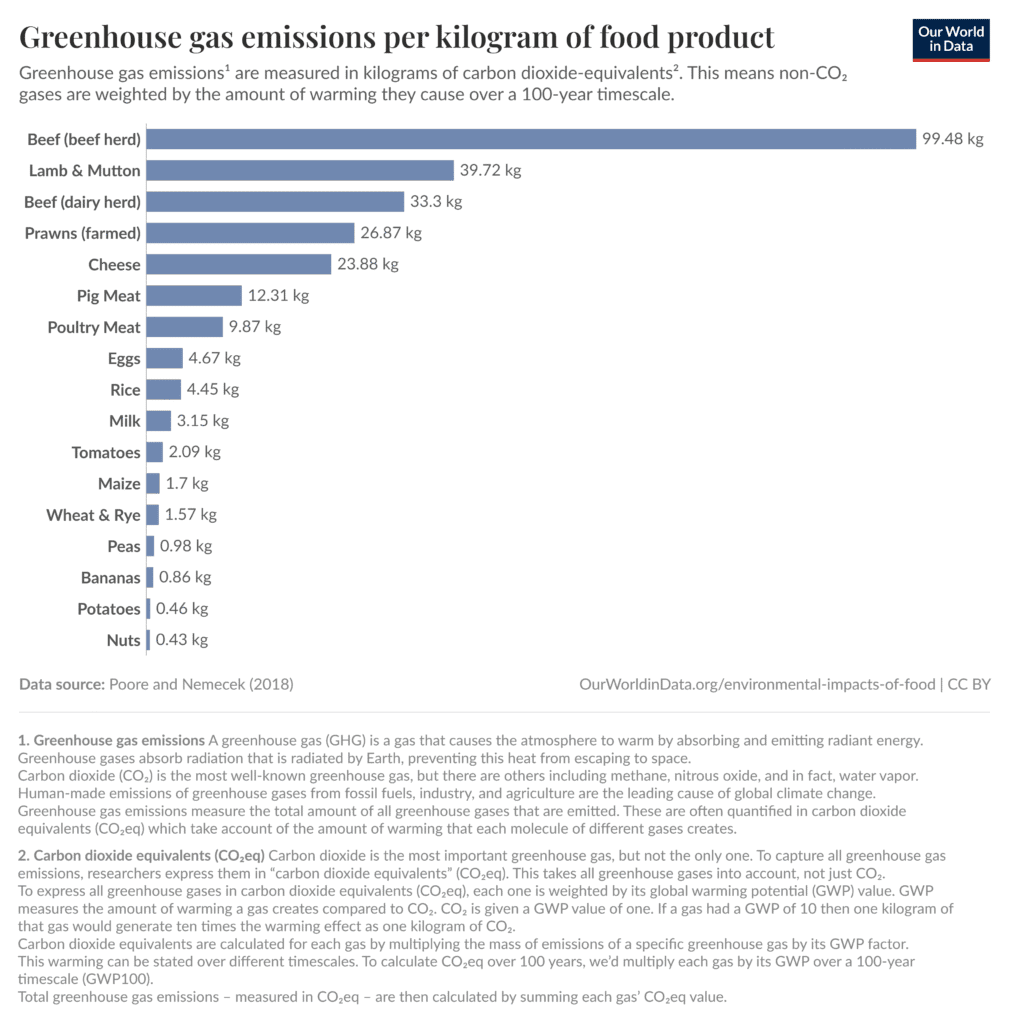This guest blog was written for Operation Noah by two work experience students, Althea and Isaac. They spent a week with us in July, following their GCSE exams, to learn about our work and help out with projects.
This blog forms part of our ‘Climate Solutions’ series, examining some of the thorny issues related to climate and investing in a green transition. You can also check our previous posts, ‘What Exactly Do We Mean by Climate Solutions?’ and ‘Are Electric Cars the Answer?‘
With the climate crisis becoming more and more extreme as each day passes, there is a larger focus across society on living sustainably. Livestock produce huge amounts of carbon dioxide and methane, around 6% of global human-induced emissions, so some people might be wondering whether to turn vegan in order to reduce their greenhouse gas emissions. But just how effective is a vegan diet?
Cutting carbon emissions
Producing a kilogram of beef emits 60 kg of greenhouse gases, whereas producing 1kg peas emits just 1kg of greenhouse gases. This is due to the combination of methane emitted by cows, deforestation in order to grow livestock feed, and the amount of land needed to cultivate cattle. And of course, cows don’t just produce beef – the dairy industry is responsible for a significant segment of these emissions. Veganism eliminates beef and dairy consumption, thus reducing carbon dioxide and methane emissions.
The food industry is responsible for a third of global emissions due to the energy required and land needed for farming, transport and packaging. Fruits and vegetables require less energy, space and resources to grow. Research has shown that even the most sustainable meat (organic pork) is responsible for eight times more climate damage than the least sustainable plant, oilseed. Furthermore, livestock farming drives deforestation, and up to 15 billion trees are being cut down every year. Adopting a vegan diet, or even cutting out some meat, can help reduce deforestation and improve biodiversity.
What about food miles?
While veganism is often perceived as beneficial for the environment, it may not always be the most effective climate solution. Many popular vegan options require extensive transportation, which release large amounts of greenhouse gases. For example, University of Manchester research recently found that asparagus eaten in the UK has the highest carbon footprint of all vegetables, mainly because much of it is imported by air from Peru.
However, generally meat releases much more carbon dioxide than these ingredients, so as long as vegans don’t have too much of these ingredients they can still keep their carbon dioxide emissions down.

But not everyone will turn vegan!
While veganism can contribute to reducing one’s carbon footprint, it is not necessarily a widespread solution since many people enjoy eating meat and dairy, and worry that a vegan diet is not nutritious. It is essential to offer a compromise for meat eaters who are still also concerned about the environment. For example, sustainable farming reduces the emissions produced by meat, allowing people to still eat meat without it affecting the climate as much. Moreover, decreasing meat consumption and encouraging others to do the same helps reduce the effects of climate change and is likely to gain wider support.
Furthermore, encouraging friends and family to try out new vegan recipes, and promoting businesses, cafes and shops to introduce more vegan food are other ways that can positively encourage people to shift to a more plant-based diet.

What’s the church got to do with it?
Institutions like the Church can significantly help to mitigate climate change. The Church of England owns over 85,000 acres of agricultural land and Operation Noah encourages churches to use this land sustainably. Operation Noah also strongly encourages the Church to support farmers in sustainable farming, which helps reduce the carbon footprint of their food.
Conclusion
To conclude, there are many benefits of veganism and it helps reduce people’s carbon footprint. Being vegan can be an effective climate solution but other lifestyle factors also need to be considered. Lifestyle choices like saving energy at home, limiting air travel and reducing food waste play a crucial role in helping deal with climate change. There is no exact solution for solving climate change, and even though not everyone will be vegan, we can all make conscious choices to protect the environment, helping to build a greener future for generations to come.
Personal views from Althea:
I think being vegan is an effective climate solution as it can significantly reduce your carbon footprint. I am vegan and I take vitamin supplements to make sure I have good nutrition. However, I understand veganism is not for everyone so I think reducing how much meat you eat is a good place to start.
Personal views from Isaac:
I think veganism is a good climate solution, but it is a very drastic lifestyle change, so I also think people should start by focusing on cutting down meat usage, and encourage others to do the same, and making other lifestyle changes as that will add up and make a big difference if lots of people do it.
